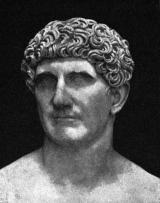¿Quién salió con Glafira?
Mark Antony salió con Glafira del ? al ?.
Glafira
Glafira (en griego antiguo: Γλαφύρα, Glaphira), nacida en Capadocia, en el siglo I a. C., fue una hetera (cortesana), conocida por su belleza, elegancia y seducción. El matrimonio entre ella y Arquelao el Viejo le permitió detentar el poder en la esfera política.
Glafira nació en Capadocia en una familia de oscuros orígenes. Nada más se sabe de su infancia hasta su matrimonio con Arquelao, el sumo sacerdote de la ciudad de Comana.
A raíz de su matrimonio con Arquelao, Glafira se convirtió en gobernadora del Estado, como su esposo. Dos hijos nacieron de la unión: Arquelao Ktistes, más conocido como Arquelao de Capadocia, que reinó del 36 a. C. al 17 d. C.; y Sisine.
En 47 a. C. el dictador romano Julio César, después de la conclusión de la guerras civiles contra Pompeyo, depuso a Arquelao el padre del solio de sumo sacerdote y nombró a Licomedes gobernador de Comana. Cuando Arquelao murió, Glafira permaneció en Capadocia con sus hijos.
Alrededor de los años 40 a. C., Glafira se convirtió en una de las amantes de Marco Antonio. Gracias a su belleza, Glafira logró persuadir a Antonio a designar a su hijo Arquelao, rey de Capadocia.
En 36 a. C., entonces, Antonio depuso y ejecutó a Ariarates X de Capadocia y le dio el trono a Arquelao.
Glafira detentó enseguida un puesto en los asuntos de la corte, mostrando interés en la política interna de Capadocia. Su influencia se puede demostrar mediante algunos versos que Augusto escribió sobre Antonio. Antonio, de hecho, se había enamorado locamente de Glafira.
Leer más...Mark Antony

Marcus Antonius (14 January 83 BC – 1 August 30 BC), commonly known in English as Mark Antony, was a Roman politician and general who played a critical role in the transformation of the Roman Republic from a constitutional republic into the autocratic Roman Empire.
Antony was a relative and supporter of Julius Caesar, and he served as one of his generals during the conquest of Gaul and Caesar's civil war. Antony was appointed administrator of Italy while Caesar eliminated political opponents in Greece, North Africa, and Spain. After Caesar's assassination in 44 BC, Antony joined forces with Lepidus, another of Caesar's generals, and Octavian, Caesar's great-nephew and adopted son, forming a three-man dictatorship known to historians as the Second Triumvirate. The Triumvirs defeated Caesar's killers, the Liberatores, at the Battle of Philippi in 42 BC, and divided the government of the Republic among themselves. Antony was assigned Rome's eastern provinces, including the client kingdom of Egypt, then ruled by Cleopatra VII, and was given the command in Rome's war against Parthia.
Relations among the triumvirs were strained as the various members sought greater political power. Civil war between Antony and Octavian was averted in 40 BC, when Antony married Octavian's sister, Octavia. Despite this marriage, Antony carried on a love affair with Cleopatra, who bore him three children, further straining Antony's relations with Octavian. Lepidus was expelled from the association in 36 BC, and in 33 BC, disagreements between Antony and Octavian caused a split between the remaining Triumvirs. Their ongoing hostility erupted into civil war in 31 BC when Octavian induced the republic to declare war on Cleopatra and proclaim Antony a traitor. Later that year, Antony was defeated by Octavian's forces at the Battle of Actium. Antony and Cleopatra fled to Egypt where, having again been defeated at the Battle of Alexandria, they died by suicide.
With Antony dead, Octavian became the undisputed master of the Roman world. In 27 BC, Octavian was granted the honorific title of Augustus, marking the final stage in the transformation of the Republic into a monarchy, with himself as the first Roman emperor.
Leer más...